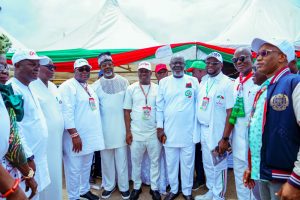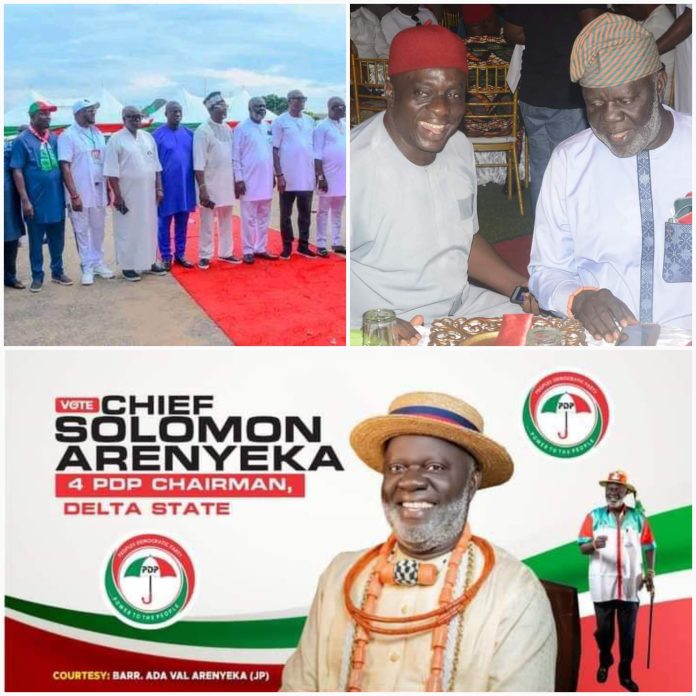By Barth Ozah
About a fortnight ago, a new set of the State Working Committee (SWC) of the Peoples Democratic Party (PDP) was elected and inaugurated following a seamless state congress, signalling a new administration for the party which has produced successive democratic administrations in the state since 1999.
Before the state congress, the party had successfully concluded wards and local government areas congresses, paving the way for the congress. What is remaining is that of the national congress or convention to elects national officers to conclude what can be regarded as a complete pyramid structure of the party in the next four years.
However, while the party awaits national convention, it is necessary for the state structure to begin to put its house in order so as to remain formidable, cohesive, united as the country navigates a precarious situation towards the 2027 general elections.

Political parties are essential institutions of democracy. By competing in elections, parties offer citizens a choice in governance, and while in opposition they can hold governments accountable.
A political party is an organisation that coordinates candidates to compete in an elections, apart from the constitutional arrangements for private candidates to contest in such elections in some advance democracies. A party also develop manifestos upon which a country is run when in government. It is common for the members of a party to hold similar ideas about politics, and may promote specific ideological or policy goals.
Political parties have become a major component of the politics of almost every country, as modern party organisations developed and spread around the world over the last few years. Interestingly, some countries have no political parties, however, this is extremely rare. Most countries have several parties while some others have just one.
Parties are important in the politics of autocracies as well as democracies, though usually democracies have more political parties than autocracies. Autocracies often have a single party that governs the country, and some political analysts consider competition between two or more parties to be an essential part of democracy.
Specifically, Delta State, a component of Nigeria, has been governed by the PDP since the country returned to democracy in 1999. Though, the party was in government at the federal level until 2015, it lost the presidential election, paving the way for the All Progressives Congress (APC) to assume power since then.
PDP has remained strong in Delta State since inception, though, this does not mean it has never faced challenges as evident in 2010 when the governorship election was annulled and rerun ordered by the election tribunal where it narrowly reclaimed power.
Another challenging time was in the 2023 General Elections where it lost the Presidential Election and performed poorly in the National Assembly elections for the first time, losing two seats in the Senate and some in the House of Representatives. The party was however quick in reasserting itself in the Governorship and House of Assembly elections where it won with landslides.
As Chief Solomon Areyinka led SWC gradually settles down for the business of repositioning of the party for consolidation of power in the state, it is pertinent to point out a few steps the executive could take to achieve that lofty mission for continued progress of the party in the state.
Ensuring good governance: Good governance means that processes and institutions produce results that meet the needs of society while making the best use of resources at their disposal. It means having a system in place that helps and guides elected members to make good decisions that guide staff to implement government policies and programmes for the benefit of the citizens.
Though, good governance is not in short supply in Delta State, it could be sustained and improved upon. Expectedly, it is incumbent upon the party executive to ensure that the government at the state and local government areas are constantly reminded of the need to ensure good governance by embarking on policies and programmes, geared towards making positive impacts on the lives of the people.
Power to the people: the founders of the party were deliberate and focused in ensuring sovereignty and absolute power is vested with the people; hence, the appropriate slogan, Power to the People of the party. The new SWC should find a way to strike a balance by ensuring that people are allowed to elect candidates of their choices in an election.
The essence of democracy is healthy competition by various aspirants and candidates in party primaries and in general elections. This is the best way to ensure that people with integrity, credibility, competence and capacity emerge at all levels – the kind in which competition brings out the best in everyone involved. It allows aspirants for political offices to tap into their potentials and do their best in order to succeed in a healthy way.
Therefore, the Solomon Areyinka led SWC should ensure that power is truly retained by the people. It should be seen as a priority to ensure that the party remains relevant and formidable.
It is somewhat undemocratic and not encouraging to constantly give the power to select candidates for elections to few elites in the name of party leaders. In African setting the elders obviously have crucial roles to play in given directions to leadership, but such power should not completely erode the tenets of democracy which thrives on healthy competition.
Today, Nigeria seems to be on stagnation as virtually all sectors of society is shaky. It is caused mainly by lack of patriotism by those in leadership positions. Political parties could begin to change the narrative by constantly enlightening and educating their members in various positions of authority and ensuring that they govern based on party manifestos and campaign promises.
Salvaging Nigeria is a collective responsibility, but the moulding structure upon which the foundation is laid should be strengthened with equity, fairness and a level playing ground during any election in the country.


